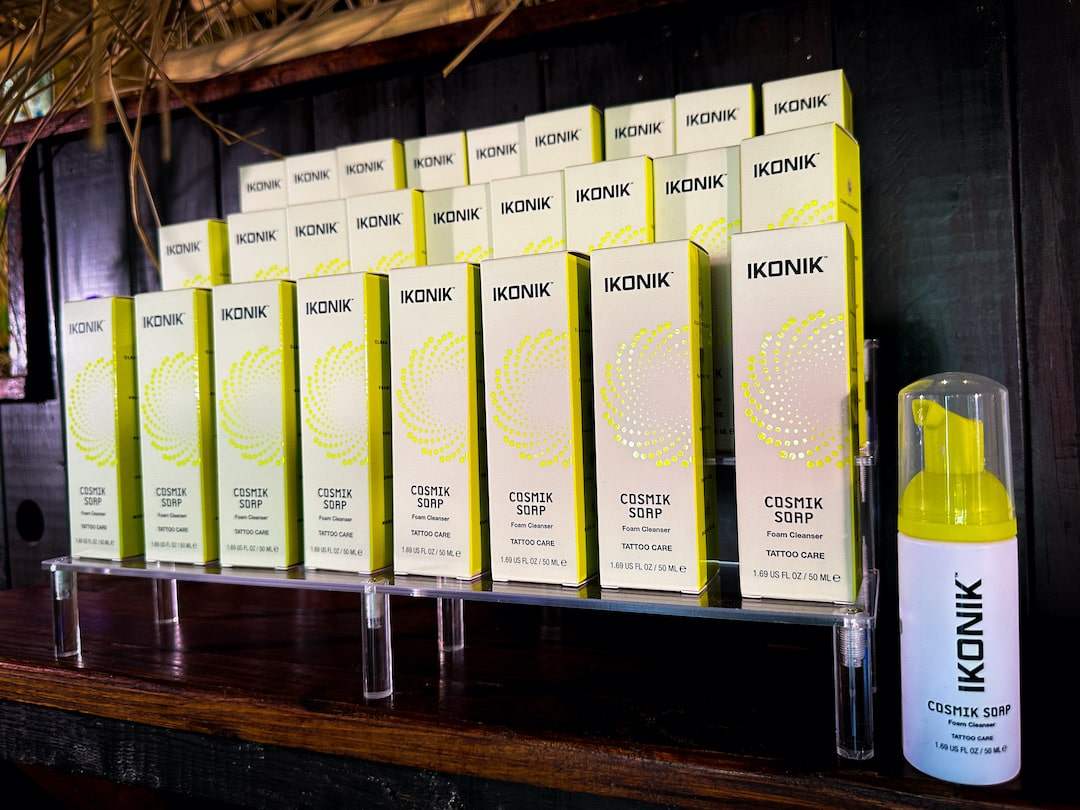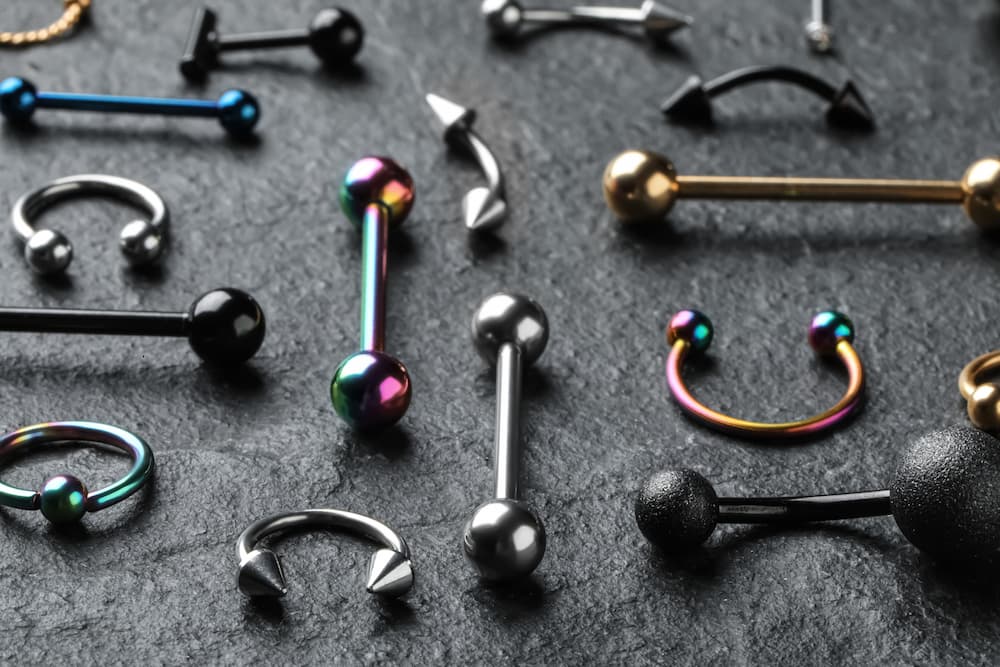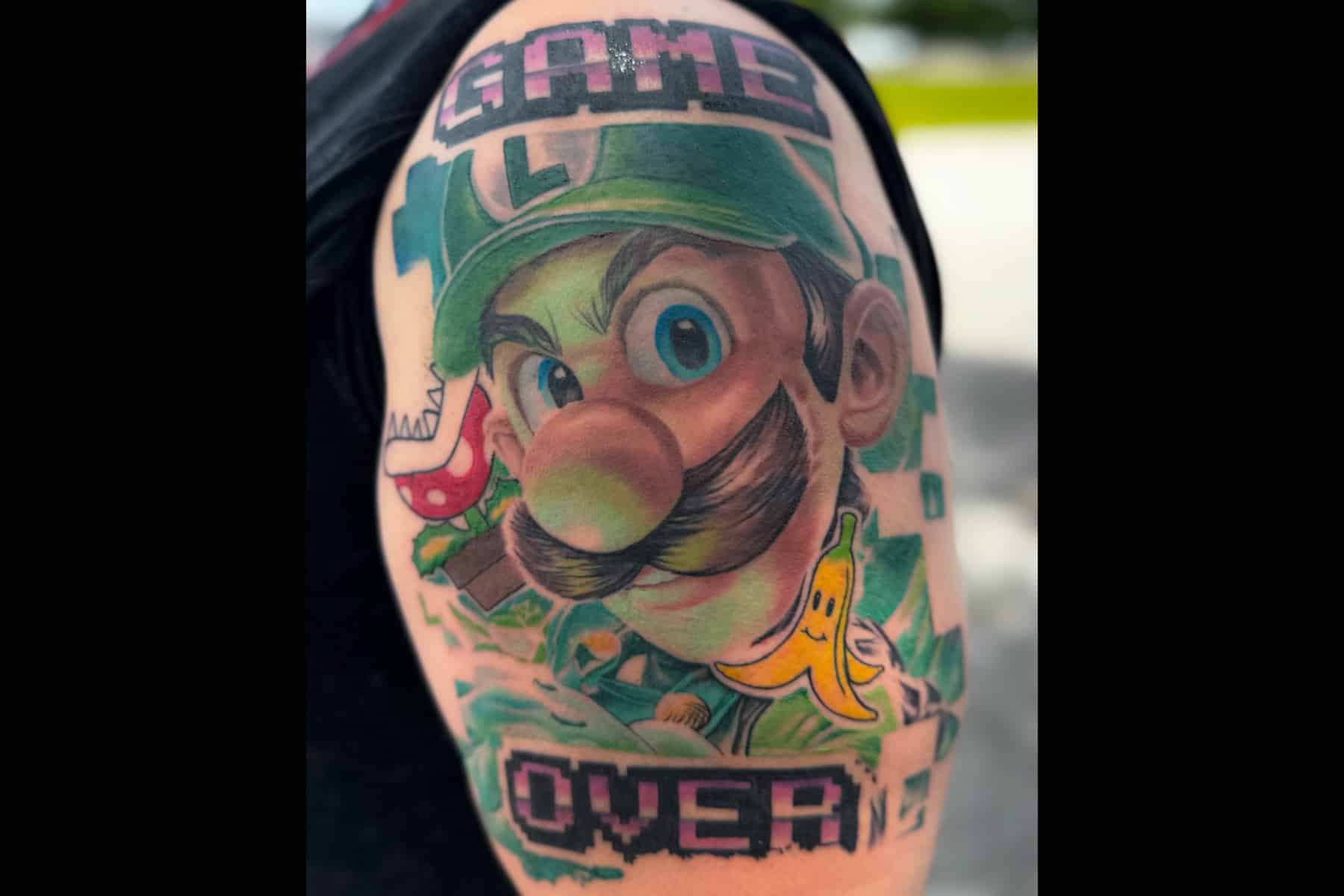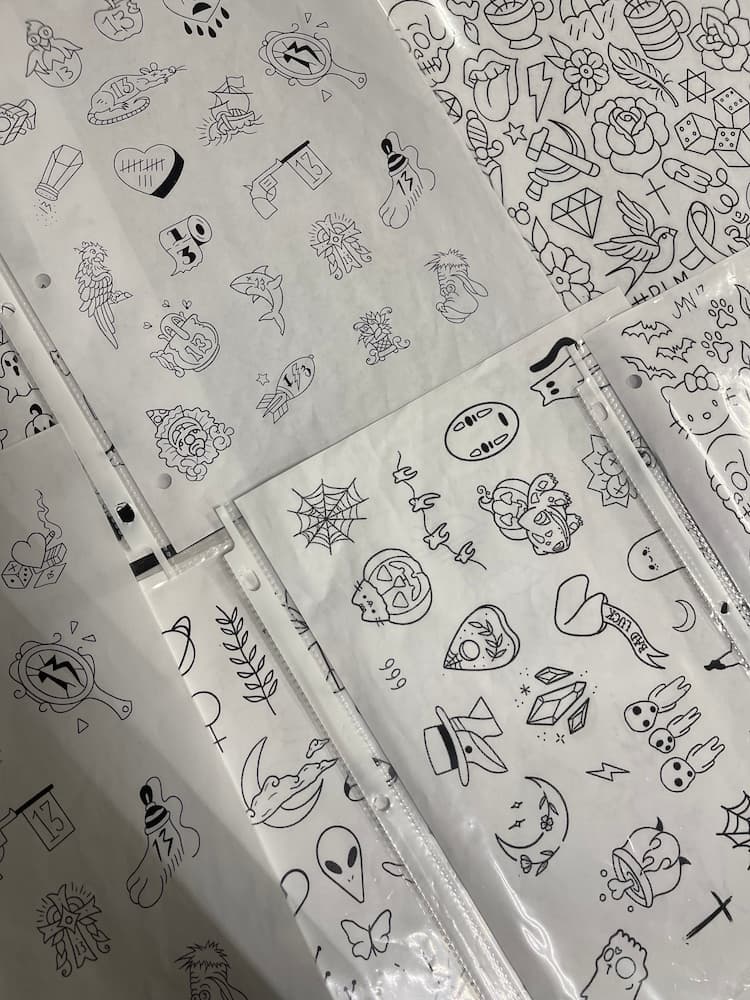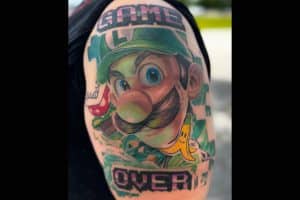Each tattoo tells a unique story, but what happens once you leave the tattoo shop? The healing process is the most annoying part of the tattoo journey. You have to deal with scabbing, itching, and potentially sleepless nights. This is where proper aftercare makes a huge difference! It protects your skin and significantly impacts the longevity and quality of your new ink.
Many states do not legally require tattoo artists to provide aftercare instructions. In states requiring aftercare instructions, it’s usually left to the artist to determine what information to provide.
Regardless of where you get your tattoo, whether you’re a first-timer or a seasoned tattoo enthusiast, the significance of aftercare never diminishes. Good Vibrations Ink hopes to address most of your concerns and share our decades of wisdom and experience caring for your new ink.
Why tattoo aftercare is important
Taking care of your tattoo is not only about preventing medical complications but also about ensuring proper healing.
It’s important to remember that getting a tattoo involves more than just creating a piece of art or expressing your personal style. It is also a medical procedure, as the artist uses a needle to insert ink beneath your skin. Whenever the skin is opened, there is a vulnerability to scarring and infections.
Once your tattoo is complete, regardless of whether you spent 30 minutes or 6 hours in the chair, nothing feels better than hearing your artist say, “We’re finished!”
You might notice your fresh ink wrapped in plastic or covered with a second skin as you leave the chair. How you care for your tattoo during the healing process depends on how your artist has covered it.
Both you and your tattoo artist play equally important roles in this process. Alongside choosing a licensed and reputable tattoo artist, taking care of your new tattoo at home is crucial.
By following the right aftercare routine, you can maintain the health and vibrancy of your tattoo for years to come.
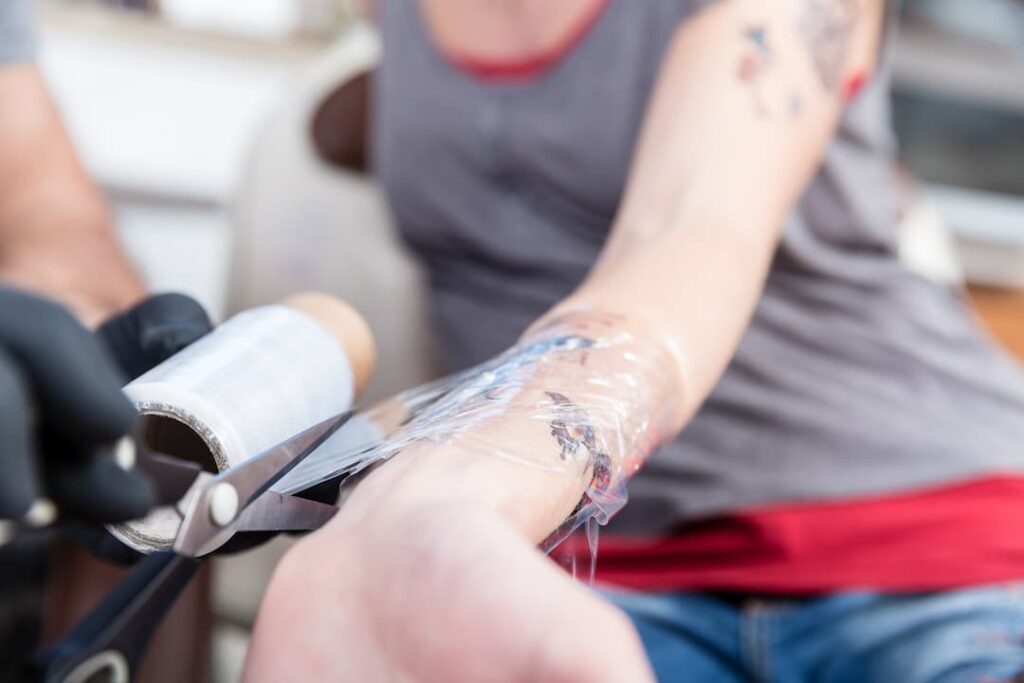
When do you start a tattoo aftercare routine?
Proper aftercare for your tattoo should begin as soon as the tattooing process is complete. Keep in mind that tattoos with colored ink generally require a longer healing process compared to non-colored tattoos, especially when the tattoo is large or located on the inside of a joint. On the other hand, etched tattoos and line work typically cause less trauma to the skin, resulting in faster healing.
Sticking to an aftercare routine reduces the risk of scarring or infection. For the first few days after getting a tattoo, it’s common to experience redness, itching, and tenderness in the tattooed area. You may also notice excess ink, blood and fluids seeping from the skin.
These reactions are normal!
What Are the Potential Symptoms and Complications of a Tattoo?
Infection
Infected skin will be a deep red color, feel warm to the touch, and be accompanied by pain. There may be pus discharge from the affected area. Keep in mind that there is a difference between abnormal pus and normal plasma discharge from a new tattoo.
Plasma is a thin, clear fluid. When wiped away, it may appear light yellow. It is normal for plasma to leak from a fresh tattoo during the first few days. This fluid is a natural part of your body’s healing process.
Pus is a thicker, opaque fluid that is typically a sign of infection (especially when it has an unpleasant odor). If you notice pus coming from your tattoo, it is important to contact your tattoo artist for advice. Address infections immediately to prevent health issues or complications that can distort your new ink.
Good Vibrations Ink prioritizes maintaining a clean, sanitary, and safe environment for every session. All of Good Vibrations Ink’s artists are certified in bloodborne pathogens and take your safety seriously in all procedures.
We’ve seen cases where other artists’ equipment or ink is contaminated. In these cases, there is a risk of acquiring bloodborne infections such as hepatitis B, hepatitis C, tetanus, or HIV. There have also been reports of other infections transmitted through tattoos, like nontuberculous mycobacterial skin infections.
Allergic Reaction
Some individuals may be sensitive to certain types of ink used in tattoos, leading to an allergic reaction. Within the first 24 hours of getting inked, your skin will turn red and itchy at the tattoo site.
A 2019 study suggests red dyes are more likely to cause allergic reactions. Red, blue, and black dyes are also associated with nonallergic skin reactions, such as photosensitivity. This being said, there is no definitive evidence for a direct cause of ink sensitivity.
Scarring
Picking at the scabs that form over your tattoo is a big NO-NO. Scabs encourage the lower layers of your skin to heal first. When you pick at them, you tear the sensitive skin beneath the new ink which can produce scar tissue. Scarring can be permanent and alter the appearance of your tattoo. It is important to handle the tattooed area with care to avoid scarring.
The artists at Good Vibrations Ink have a collective experience of over fifty years and have seen almost every type of ensures the creation of top-notch tattoos. Employing modern and traditional techniques, our artists prioritize a safe and clean environment for tattooing and piercing.
What do I need for tattoo aftercare?
When it comes to aftercare, simplicity is key, yet it remains the most crucial aspect of tattoo care. The golden rule to remember is that a little goes a long way.
Regardless of the aftercare product, gently apply a thin layer to the tattooed area approximately 3-4 times daily. This allows the tattoo to breathe while maintaining proper moisture. It’s important that your skin is dry before applying the aftercare product.
After showering, allow your tattoo to air dry for at least 20 minutes before applying the recommended lotion. To clean the area, use a mild, fragrance-free soap or a tattoo-specific cleanser recommended by your tattoo artist.
Good products to use and why
Your aftercare product needs to be fragrance-free, alcohol-free, and free from additives such as colored dyes that can potentially dry out your skin. We recommend using a mild, fragrance-free soap or a specially formulated tattoo cleanser. Avoid using shower gel or bar soap for tattoo cleaning. Your tattoo artist can provide recommendations for tattoo-specific cleansers.
At Good Vibrations Ink, we recommend IKONIK’s pre-care and aftercare product line.
Before you get your tattoo, IKONIK offers Tonik Cream for tattoo numbing relief, providing fast pain relief within 60-120 minutes, suitable for all tattoo sessions.
During the tattoo session, IKONIK provides Statik Gel to secure stencils, Optik Glide for smooth tattooing with high-definition results, Cosmik Soap for clean skin maintenance, and Stoik Spray for ongoing pain relief, especially in sensitive areas.
For aftercare, IKONIK offers Epik Cream with restorative properties to reduce inflammation, soothe irritation, and maintain the vibrancy of the tattoo, ensuring it makes a lasting statement.
We carry these and other products at our locations in Orlando, Florida, on International Drive. We also recommend using clean towels, bedding, and clothes during the healing process to prevent contamination.
In addition to proper external care, nourishing your body can aid healing. Consuming a diet rich in fruits and vegetables containing omega-3 fatty acids and antioxidants can provide beneficial effects.
These foods often possess anti-inflammatory properties that can contribute to the healing of your tattoo.
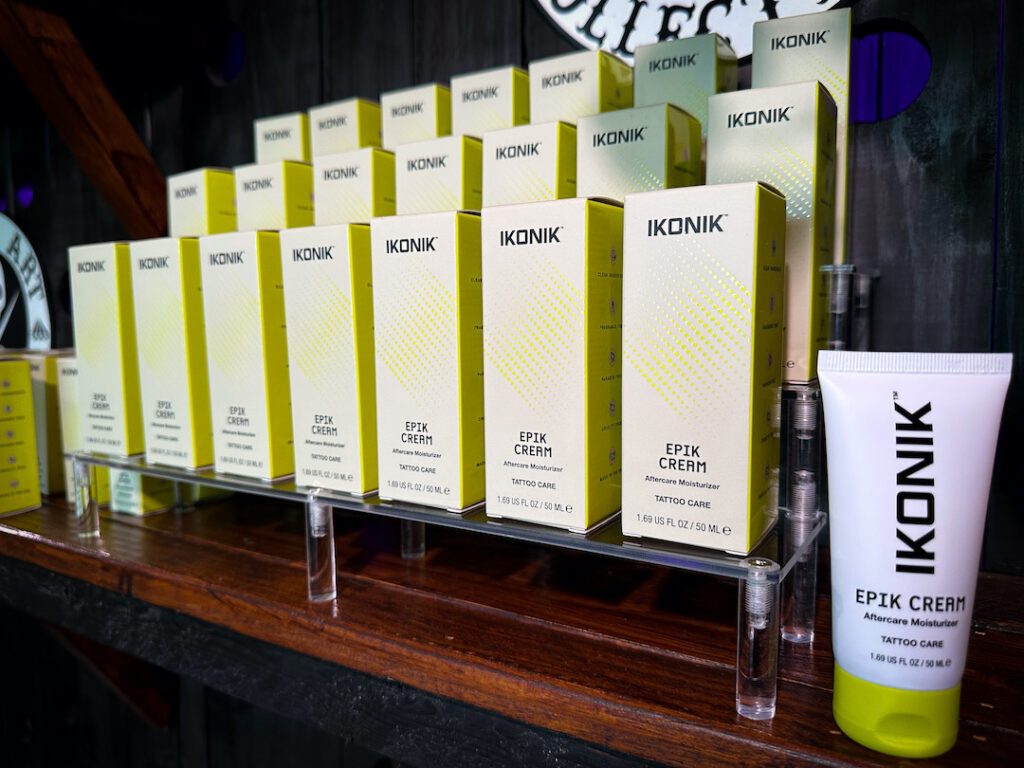
Products to avoid and why
Not all products are created equal. While some are made specifically for tattoo care, like IKONIK’s products, others are NOT and can even pose a risk to your health and visibly alter your tattoo. Here is the shortlist of products to avoid:
- Ointments: It will feel like your skin is absorbing the ointment and making your skin smooth and soft. However, ointments can house bacteria which can lead to infection and excess scabbing. We recommend steering clear of ointments during your healing process.
- Petroleum-based products: Avoid products that are 100 percent petroleum-based, like Vaseline. These products are designed to block moisture from entering the skin. This also means they can trap moisture, dirt, and bacteria in your skin. The American Academy of Dermatology finds these products cause the ink to fade and prevent your tattoo from breathing properly.
- Aquafor: Marketed as a protective skin ointment, Aquafor contains petroleum, mineral oil, and other ingredients that may impact the appearance of tattoos. Petrolatum and mineral oil can bind to the ink in a fresh tattoo which will remove it over time and cause your tattoo to look faded. While no official study shows the extent of ink removal by Aquaphor, our experience has seen it negatively impact your tattoo’s longevity.
- Neosporin: Designed to help heal minor cuts and fight infection, Neosporin is not designed to help heal tattoos. If you use this product over an extended period of time, be aware that some people experience allergic reactions. These can show up as small red bumps on the infected area, which can cause the ink to fade or result in a spotty design.
Good Vibrations Ink also recommends avoiding alcohol in large quantities, as alcohol can cause additional inflammation in the body, potentially interfering with the healing process of your tattoo.
What activities should you avoid after getting a tattoo?
Avoiding certain activities during the aftercare period is important. Here are the main activities you should steer clear of:
- Touching, Picking, Scratching, and Rubbing: Refraining from scratching, picking, or rubbing your new tattoo is crucial. Doing so can lead to color loss, scarring, and potential infection. If your tattoo becomes itchy, gently pat the area and apply the appropriate aftercare lotion. Avoid any actions that could disrupt the healing process.
- Exposure to Direct Sunlight: Protect your tattoo from direct sunlight, as UV light can fade tattoo inks. Apply a broad-spectrum, water-resistant sunscreen with an SPF of 30 or more whenever you go outside. Reapply sunscreen every two hours. Direct sunlight during the healing process can damage your skin and compromise the longevity of your tattoo. If unavoidable, apply tattoo-specific SPF 30+ sunblock when exposed to the sun.
- Shaving: Avoid shaving over your new tattoo until it has fully healed. Shaving could remove scabs prematurely and cause irritation. However, once the tattoo has healed, shaving is safe and can help enhance the vibrancy of your tattoo.
- Excess Exposure to Water: While getting your tattoo wet during the aftercare process is acceptable, avoid soaking it in water for at least three weeks or until it has fully healed. Water exposure can interfere with the healing process and increase the risk of infection. Avoid swimming in pools or natural water bodies during this period.
- Tight-fitting Clothing: Opt for loose-fitting clothing that allows your tattoo to breathe. Tight clothing can stick to the skin, restrict airflow, and cause sweating, chafing, and rubbing. Choose breathable fabrics and avoid excessive sweating activities, like a heavy workout, or wearing tight activewear that can stretch and irritate the tattooed area.
- Excess Sweating: Avoid engaging in activities that cause excessive sweating, such as intense workouts or sauna sessions, until the tattoo has completed the second round of peeling. Excessive sweating can expose your tattoo to bacteria and potentially stretch or chafe the tattooed skin.
- Excess Drugs, Cigarettes, and Alcohol: Avoid excessive drug use, smoking cigarettes, and consuming alcohol after getting a new tattoo. These substances can negatively impact your overall health, hydration, and skin condition. Moderation is key, and maintaining good hygiene by washing your hands thoroughly is essential.
- Re-Bandaging: Do NOT re-bandage your tattoo once the initial bandage is removed. It needs to breathe and receive moisturization at its own pace. Reapplying a new bandage can impede the healing process.
By avoiding these activities, you can promote proper healing and preserve the quality of your new tattoo. Remember to follow the instructions provided by your tattoo artist and consult them if you have any specific concerns.
7 Aftercare Tips for a Long Lasting, Bright, and Vibrant Tattoo
1: Cover it up (immediately after)
After your tattoo is finished, your artist will apply a thin layer of IKONIK’s Epik Cream and cover the tattoo with a bandage or plastic wrap. The cream will add moisture to your skin while the wrap protects against bacteria and prevents friction with clothing. Follow your artist’s recommendation on how long to keep the covering.
2: Gently wash the tattoo (ongoing)
Keeping your new tattoo clean cannot be overstated. Once the recommended time has passed to keep the covering on your tattoo (generally a few hours to 1 day), wash your hands thoroughly before removing it. The covering should be carefully removed in the shower after soaking the surrounding area. Gently cleanse the tattoo with warm water and fragrance-free soap. Good Vibrations Ink recommends cleaning your skin with IKONIK Cosmik Soap while in the shower at least once per day. Pat the area dry with a soft cloth and apply a small amount of fragrance-free, alcohol-free moisturizer (we recommend IKONIK’s Epik Cream).
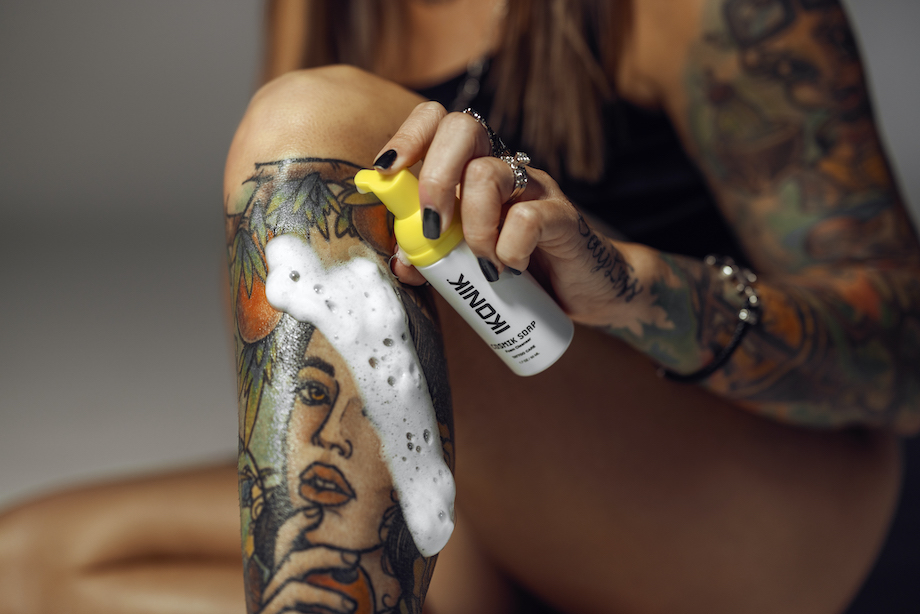
3: Allow it to breathe and heal (ongoing)
Keep the covering off and let your tattoo breathe. Wash the tattoo once or twice a day with clean hands, warm water, and fragrance-free soap. Apply a fragrance-free, alcohol-free moisturizer after washing. Avoid scrubbing or picking at any scabs that form.
4: Monitor the healing process (ongoing)
In the following days, your tattoo will go through different stages of healing.
Plasma, a clear fluid composed of water, electrolytes, and proteins, can be expected to leak from a fresh tattoo within the first day or two after getting inked. This leakage is a natural part of the healing process and helps to form a protective barrier over the tattooed area, aiding in the prevention of infection and promoting the initial stages of skin regeneration.
Wash it regularly, moisturize it, and avoid picking at scabs. If you experience prolonged redness, swelling, or signs of infection, consult your tattoo artist or a doctor.
5: Protect from the sun and avoid excessive weight changes (ongoing)
Wear sun-protective clothing to prevent fading caused by UV exposure. Avoid scratchy fabrics that may damage the tattoo. Additionally, try to maintain a stable weight, as significant weight changes can stretch or distort the tattoo.
6: Stay hydrated and maintain a healthy diet (ongoing)
Drink plenty of water to keep your skin hydrated. A diet rich in fruits and vegetables with omega-3 fatty acids and antioxidants can aid healing and promote skin health.
7: Be patient (long-term care)
The complete healing process may take several months. Continue moisturizing until the skin appears hydrated again. By the end of the third month, your tattoo should have regained its bright and vivid appearance.
By following these steps and practicing proper aftercare, you can help ensure your tattoo looks its best for years to come. Remember to reach out to your tattoo artist or seek medical assistance if you experience any concerns or symptoms of infection.
Enjoy your new ink!
To sum it all up, proper aftercare is vital for overall health and longevity, regardless of whether it’s your first or twentieth tattoo.
The healing process and duration can vary depending on the size and complexity of the tattoo. Larger tattoos may require more time for redness and swelling to subside due to the increased trauma to the skin.
At Good Vibrations Ink, we emphasize the importance of understanding and implementing good aftercare practices. We want your tattoos to remain beautiful and vibrant for as long as possible, which is why we provide comprehensive instructions for optimal results.
If you have any further questions or concerns, please contact our shop and speak to an artist.
We hope you enjoy your new ink and appreciate the artistry behind it!

